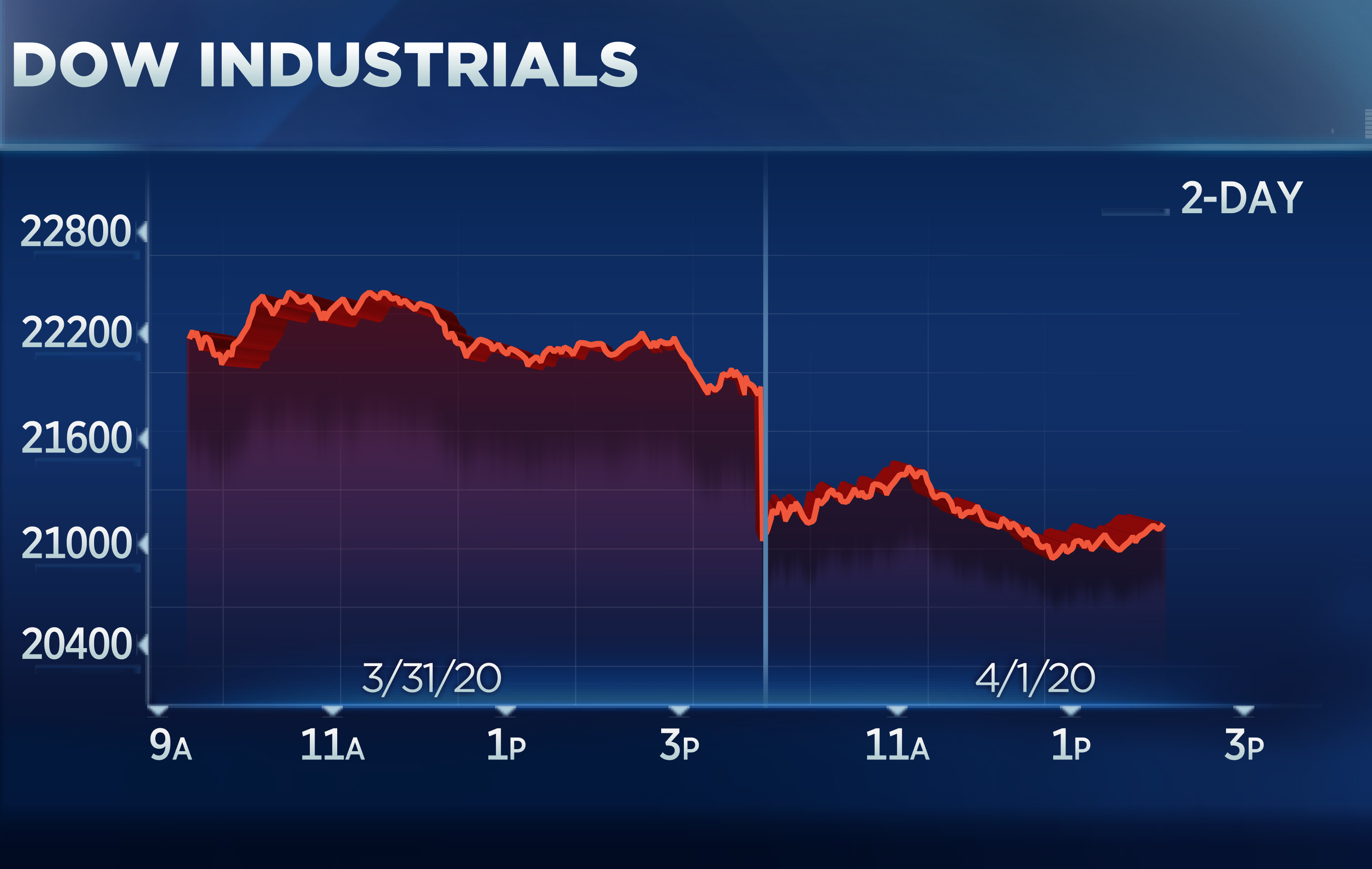
Stocks sank on Wednesday as Wall Street kicked off the second quarter on a sour note thanks to persistent concerns over the spread of the novel coronavirus.
The Dow Jones Industrial Average traded more than 800 points lower, or 4%. The 30-stock average hit a session low around 12:40 p.m. ET, trading more than 950 points lower. The S&P 500 slid 4.2% while the Nasdaq Composite lost 3.8%.
President Donald Trump said Tuesday evening the U.S. should prepare for a “very, very painful two weeks” from the rampant coronavirus. White House officials are projecting between 100,000 and 240,000 virus deaths in the U.S.
“This is going to be a rough two-week period,” Trump said at a White House press conference. “When you look at night the kind of death that has been caused by this invisible enemy, it’s incredible.”
New York Gov. Andrew Cuomo said Wednesday he is closing all New York City playgrounds, adding the state’s model projects a high death rate through July. He also said cases in New York state now total more than 83,000.
“There’s still tremendous uncertainty,” said Patrick Kaser, portfolio manager at Brandywine Global. “We can look at history as a guidepost for the market and the economy, but there’s not a perfect scenario.”
“In situations like this, the best thing for long-term investors is to figure out what they want longer term,” he said.
Boeing, American Express and Dow Inc all fell more than 7.5% to lead Dow industrials lower. Real estate investment, utilities, energy and financials led the S&P 500 lower with each of those sectors down at least 5%.
Data from ADP and Moody’s Analytics showed U.S. companies cut 27,000 jobs through March 12. Actual losses for the month were far worse, as shown by the record number of jobless claims in the week or March 20. Meanwhile, ISM manufacturing index fell to 49.1 in March from 50.1 in February, signaling a contraction in U.S. manufacturing activity amid the pandemic.
On Tuesday, the Dow fell 410 points or 1.8%, while the S&P 500 lost 1.6% to close out their worst first-quarter performances of all time. The Dow fell more than 23% in the first quarter; that was also its biggest quarterly fall since 1987. The S&P 500 fell 20% in the first quarter, its biggest quarterly loss since 2008.
DoubleLine Capital CEO Jeffrey Gundlach said that the coronavirus driven market rout will worsen again in April, taking out the March low.
“The low we hit in the middle of March … I would bet that low will get taken out,” Gundlach said in an investor webcast on Tuesday. “The market has really made it back to a resistance zone. … Take out the low of march and then we’ll get a more enduring low.”
The coronavirus pandemic has caused a nationwide shutdown of the economy, halting business production and leaving millions of American workers unemployed. The unprecedented societal disruption has caused financial distress and volatility never seen before.
“The quarter will be remembered as the fastest and greatest drop in the stock Market for the start of any post-war bear market,” said Jim Paulsen, chief investment strategist at the Leuthold Group. “This reflects the fact that this Bear is the only one cause by a recession which was simply ‘proclaimed’ as leaders announced they were essential shutting down the economy. Since a recession was ensured, the Bear skipped all its normal foreplay and simply went right to the end fully reflecting a recession almost immediately.”
U.S. oil experienced its worst month and quarter in history, losing more than 66% of its value in the first three months of the year. Demand has evaporated due to the coronavirus outbreak and a price war between Saudi Arabia and Russia.
More than 874,000 cases have been confirmed around the world, according to Johns Hopkins University. Of those cases, over 189,000 are in the U.S. Dr. Anthony Fauci, director of the National Institute of Allergy and Infectious Diseases, told CNN that he is starting to see “glimmers” that social distancing is helping to lessen the spread of the coronavirus.
However, the sell-off has provided active managers with some opportunities for more active managers and investors, said John Davi, chief investment officer at Astoria Portfolio Advisors.
“The baby is being thrown out with the bathwater,” said Davi. “This is a time I think for stock picking and thematic investors. I don’t think the S&P 500 will move as much because I think there’s gonna be a lot of winners and losers. That’s why I think this is the time for active management.”
— CNBC’s Eustance Huang contributed to this report.
Subscribe to CNBC PRO for exclusive insights and analysis, and live business day programming from around the world.

